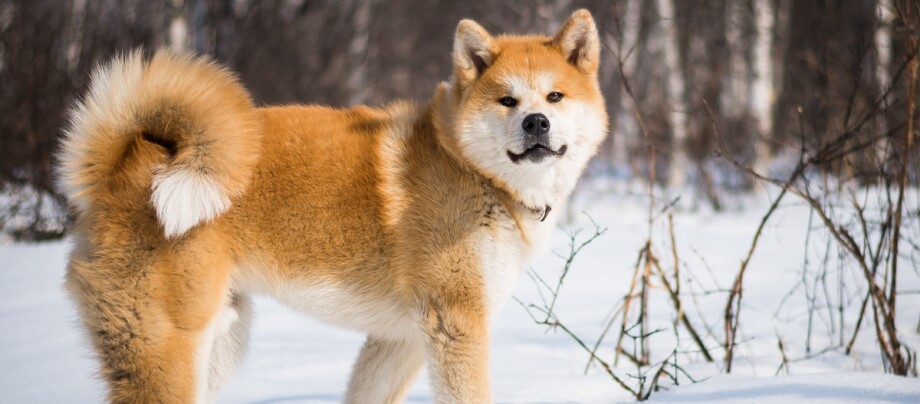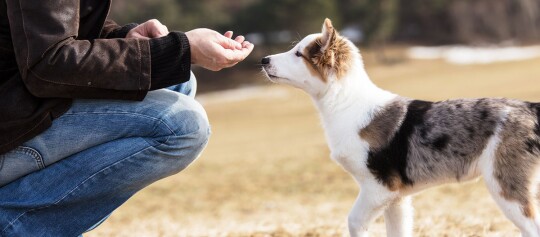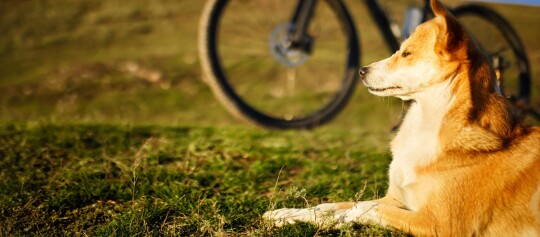Akita Inu - Revered for Their Loyalty and Strength
02.01.2024 - Reading time: 3 minutes

Dogs are very highly regarded in Japan – to such a degree that some typical breeds have even been elevated to the status of a “national natural monument”. This was the case of the Akita Inu in 1931. Even today, pure breed Akitas are considered a status symbol. The Second World War brought them back from the brink of extinction, since breeding had almost come to a standstill. Nowadays this large dog with its characteristic appearance enjoys huge popularity worldwide.
NewsletterAkita Inu
Breed | Akita Inu |
Origin | Japan |
Classification | Spitz and primitive type dogs/service dogs |
Size | 67 to 70 centimetres (male), 61 to 64 centimetres (female) |
Weight | approx. 40 kilograms (male), approx. 35 kilograms (female) |
Physique | majestic, muscular figure, tapering claws, tail carried high and rolled up |
Eyes | small, triangular, dark brown |
Ears | triangular, pointed towards the front |
Coat and colour | coarse hair, thick undercoat; colours: red, white, sesame or brindled; with white markings on the head and the underbody and insides of the legs from the muzzle to the tail (so-called urajiro markings) |
Special features | loner |
Nature | withdrawn, proud, loyal, stubborn |
Care | regular coat care with brush and comb |
Health | increased risk of autoimmune diseases, hypothyroidism, hip joint dysplasia and hereditary diseases of the inner ear |
We have the best products for your Akita Inu!
Breed history of the Akita Inu
The name Akita Inu (Inu is Japanese for house dog) comes from Akita Prefecture on the Island of Honshu. Its forefathers are thought to have accompanied the first people that colonised the island. Experts believe that in the earliest days there were crosses with the grey wolf. All of which means that the Akita Inu is one of the oldest original dog breeds. The task of this dog was hunting, the quarry sometimes even including bears. They also helped in everyday life as hauling dogs.
In Japan the Akita Inu has been given the status of a “national natural monument” by imperial decree. Until 1945 the animals were not permitted to be exported. After the end of the Second World War, some breeding samples found their way to the USA , where they were crossed with the Shepherd to create the “American Akita”, which is now recognised as a separate breed. Both breeds are recognised by the FCI (Fédération Cynologique Internationale).
Character of the Akita Inu
The Akita Inu is a gentle and good-tempered dog, that doesn’t get easily roused. Aggressiveness or anxiety are simply not part of its temperament. However, it does tend to dominance if it believes itself superior to its owners and has a fair deal of stubbornness. The dogs are alert and have a strong urge to protect their human pack. However, the Akita Inu will never obey blindly and does not feel any great need to please its owners. It tends to ignore strangers completely as long as it does not see them as a source of danger.
Training and keeping an Akita Inu
The Akita Inu requires a firm hand when training and an owner whose commands it can respect as the leader of the pack. With sensitivity, consistency and respect for the individual personality of the animal it is possible to train this dog well. Once it is well socialised and its character has been properly consolidated, the Akita Inu is a fabulous family dog and companion, that needs a close connection with a small group of people.
These exercise-loving, active dogs need to be occupied. If they do not have access to a large garden or extensive grounds, they need long walks and activities in the open air. Dog sports and agility classes are, however, not the right activities for the Akita. It is much happier accompanying you on cycle rides or jogging.
Care of the Akita Inu
Their care is simple. The dog needs regular brushing to remove dead hair, but that is all.
Special features of the Akita Inu
Atypically for a dog, the Akita Inu is a loner and often adopts a dominant attitude when it comes into contact with other dogs. In order to avoid problems with strange dogs on a daily basis, enrolling in puppy school is recommended.
Unfortunately, the Akita is susceptible to a number of illnesses, but these can be avoided if breeding is carried out responsibly. Therefore contact the German Kennel Club (VDH) for the names of reputable breeders.

